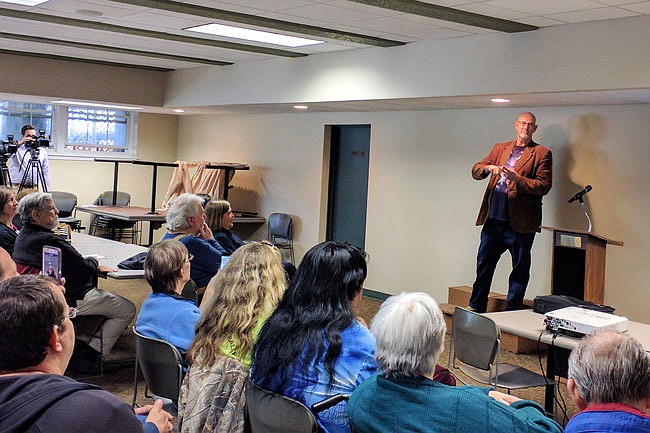For many members of the local deaf community, the Missouri School for the Deaf was as much of a home as their parents' house.
"I cherish that school," Graduate Rhoda Lee said.
Students still spend five days and nights per week, nine months of the year, living, learning and playing among peers and staff who understand them. Alumni now fear a proposal to place a new Callaway County Justice Center at Rice Hall could spell the end of MSD. They shared their concerns during a Friday forum at William Woods University.
"I took (my son) to school there at age 8," said Mary Karnes, a Fulton resident and parent of a deaf child. "If there had been a jail on campus, I would've thought long and hard before sending my child there, and I probably would have decided no."
WWU students in the American Sign Language interpretation program helped organize the forum, which was attended by MSD alumni, members of local government and other community members. Alumni quoted in this article spoke through interpreters.
"We're here to support the deaf community as allies, not as representatives," Brown said.
The meeting opened with a brief summary of the situation: with the county's jail facilities slowly crumbling and a too-small county courthouse, local government is eyeing Rice Hall as a potential solution. (Read more about those issues at: bit.ly/2U2tsds)
Rice Hall is currently owned by the State of Missouri, but a bill by Missouri Sen. Jeannie Riddle, R-Mokane, proposes selling the building. County commissioners have suggested acquiring the building and renovating it for use as a combined courthouse and jail.
Rice Hall is on the corner of campus, but is still only a block away from the elementary school dorms.
The deaf community's reaction was overwhelmingly negative.
"I never envisioned something like this happening," Alumnus Dave Eaker said.
The friends he's talked to about this situation, both hearing and deaf, have been similarly shocked, he said.
He pointed out that hearing parents contemplating sending their children to MSD don't have all the information. They may not understand how valuable a place like MSD can be: a community where everyone speaks your language and understands your challenges.
"When they're making choices, they're going to rely on what they already know," Eaker said.
When the first thing a parent sees is high fences and a jail on campus, it's going to make a bad first impression, he said.
"We already have a state hospital next to the school and I can tell you parents have reservations about allowing their children to live in that kind of environment," Ella Eakins, president of the MSD Alumni Association, said in a written statement.
Community members have serious safety concerns, as well.
"If you've got inmates on the loose and police that have to track them down, maybe with weapons drawn. I don't think that's a safe situation at the school," said Monielle Collins, who graduated from MSD in 2005.
Alumna Rhoda Lee pointed out that deaf children are vulnerable in ways their hearing peers are not - they can't hear shouts to get down, or a speeding car or running footsteps.
"Even if a security fence is put around both the properties, the jail and the school, it is not fair to ask the MSD students to be treated as if they were the ones in jail," 1967 graduate Norma Vickers said.
She added that during her own school days, Fulton locals sometimes assumed MSD and the adjacent Fulton State Hospital were part of the same campus, increasing the stigma against the deaf students. Adding a jail would compound the issue, she fears.
"I stayed on that campus nine months of the year, and I was always so eager to go back," Alumna Marjorie Mize said. "I considered it more of a home than the one I shared with my parents. We need to preserve that school's history."
Several speakers suggested alternative uses for the Rice Hall complex, such as a nursing home open to deaf and hearing residents.
Reaction
Government officials in attendance, including county commissioners Gary Jungermann and Roger Fisher, voiced appreciation for the community's willingness to share.
"I didn't realize they'd feel this much weight on their shoulders," Fisher said.
Jungermann confided that it's looking increasingly unlikely the county will acquire Rice Hall.
"The potential savings I thought we could get are not nearly what we thought they might be," he said.
An initial estimate put the savings at $5 million-$10 million (of an estimated $30 million total for the justice center project); recent figures have lead the commission to believe that total savings would be less than $2 million, he said. Renovation costs, the costs of operating a larger building than expected and other factors have chipped away at potential savings.
"And that's just from what we can see - there could be hidden costs," he added. "It's not looking that great."

